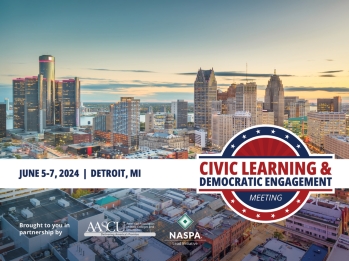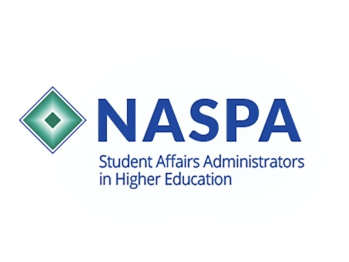
January 8, 2024
Registration Opens
March 29, 2024
Early Bird Registration Deadline
May 27, 2024
Regular Registration Deadline
2024 Civic Learning & Democratic Engagement Meeting
Division/Group Events
June 5 - June 7, 2024 Detroit, MI
Each year, the Civic Learning and Democratic Engagement conference brings together faculty, student affairs administrators, students, senior campus leaders, and community partners to advance institutions' commitment to advancing democracy. This is the only event that convenes this diverse range of stakeholders to ensure that students who graduate from colleges and universities, both public and private, are prepared to be the informed, engaged citizens our communities and democracies need.
This year's event will take place from June 5 - June 7, 2024 in Detroit, Michigan.
Participants will have opportunities to network and develop their civic-minded thinking and practices through engaging plenary sessions, informative general interest sessions, interactive workshops, and roundtable discussions.
Use the hashtage #CLDE24 to connect with other attendees at the conference and see what everyone is talking about!
Presented By

About
Our 2024 CLDE (CLDE24) will facilitate exchanges of knowledge and develop a sense of community around our shared civic learning and democratic engagement work. As a community we have adopted the CLDE Theory of Change and strive to create effective strategies and models that strengthen civic learning and democratic engagement. Participants will have opportunities to network and develop their civic-minded thinking and practices through plenary sessions, site visits, concurrent sessions, posters, receptions, pre-conference workshops, and working meetings.
Venue

Most conference activities will take place at the Detroit Marriott at the Renaissance Center.
NASPA is arranging special room rates for conference attendees that are yet to be determined. The cut-off to recieve the special rate will be annouced when the housing block opens. Rooms in the conference block may sell out prior to the cut-off date, so please make your reservation as soon as possible.
Reserving a room within the conference block by using the hotel's dedicated meeting website or toll-free telephone number not only benefits you, it also helps to support the conference. When you book within our block, you help keep meeting costs as low as possible and enable us to provide some of the important features meeting attendees have come to enjoy, such as networking receptions, coffee breaks, and off-site pre-conference programs.
The conference room block closes on May 13.
Additional Information
Travel
The Detroit Marriott at the Renaissance Center is serviced by the Detroit Metropolitain Wayne County Airport. The hotel is approximately 22 miles from the airport. Visit airport website for more information.
Parking
Off-Site Parking: Beaubien Garage provides "in & out" privileges 0.1 Miles
On-Site Parking: Valet only, $40/day
Weather
The average temperatures in Detroit, MI are around 78 degrees F during the day and 60 degrees F in the evening. As the conference gets closer, please visit the Weather Channel for more information.
Please note, the hotel and meeting areas may have cooler temperatures. A sweater or jacket is recommended.
Registration
Registration for the 2024 Civic Learning and Democratic Engagement Conference (CLDE) is now open!
Regular Registration has been extended!
The registration fee includes all regular program sessions and meals. The registration site requires you to create a NASPA account in order to register for the conference. There is no cost to create an account. The registration rate is the same for AASCU and NASPA members as well as non-members.
| Registrant Type |
Early Registration Jan. 8 - Mar. 29, 2024 |
Regular Registration Mar. 30 - May 27, 2024 |
Late Registration After May 27, 2024 |
| General Registration | $550 | $625 | $695 |
| Student Registration | $380 | $380 | $380 |
| Team Registration | $500 | $575 | Not Available |
Registration rate for students is for undergraduates and full-time graduate students at AASCU/ADP and NASPA colleges and universities.
*In order to obtain the team rate, you must contact Jill Dunlap at [email protected] with the names of the team members you wish to register, AFTER you have confirmed that each team member has an established NASPA account (separate from membership and free to create). Team members must all be from the same institution to qualify for the team rate and the team rate registration must be paid with one payment online using a credit card. The team rate is available until May 13, 2024.
**Please note that you must register your team together using one credit card per institution to access the team rate. The team rate cannot be retroactively applied. No refunds will be given for individuals that purchase their registration individually in order to apply the team rate at a later date.**
We encourage you to register for pre-conference sessions and site visits during the registration process. Pre-conference sessions and site visits will cost $50.
Refunds will be given for cancellations less a $50.00 processing fee. In addition, a processing fee of $50.00 per registration will be charged for credit cards declined. Please allow 30 business days for processing. To inquire about the status of a refund after 10 business days, please send an email to [email protected].
Schedule
Schedule at a Glance
June 4
June 5
June 6
June 7
1:00 PM - 4:00 PM
Pre-conference Workshops
Details
| The Power of Partnering with Election Officials
Working together with your local election officials is a great way to foster partnerships within civic learning and democratic engagement. This session will present a case study of the Michigan Collegiate Student Advisory Task Force where college students serve as liaisons between the Michigan Department of State and their campus populations to advise on department policies and their impact on student voters. Participants will receive strategies and resources to foster and/or strengthen relationships within their own municipalities and states. |
| Civic Engagement for a New Generation
Most of the civic engagement practices being used today were developed by other generations with a completely different technological and cultural landscape: rallies and marches, phone banking and door knocking, working with institutions like faith organizations. How relevant are these approaches today? In this session, you’ll learn about new innovations in outreach, coalition-building, and engagement. From working with artists and influencers to developing events that bring new, diverse people into movements, this is civic engagement for a new generation.
|
| The Role of Students’ Voices in Equity and Democracy in Higher Education
As institutions seek to become more student-centered, a critically important question is how do we incorporate the students’ voices and experiences in higher education. Institutional outcomes and students’ educational experiences can be improved when students’ voices are included throughout the student life cycle and in decision-making. Join us as we explore approaches to capturing and operationalizing students’ voices to strengthen equity and democracy at our institutions.
|
4:15 PM - 6:00 PM
ADP Meeting
8:30 AM - 9:30 AM
CLDE Orientation
10:00 AM - 12:00 PM
Site Visits
Details
| The Motown Experience
Learn about the birth of Motown by exploring the original Studio A of Hitsville U.S.A. On this tour, we’ll take a bus to the Motown Museum, located in midtown Detroit, and enjoy a guided tour through one of the epicenters of musical creativity in America in the 1960s. We’ll see instruments, costumes, memorabilia, photos, and gold records from the Supremes, the Temptations, and the Jackson 5, among other artists. Motown helped to usher in significant cultural and social change as a prominent African American-owned label that achieved crossover success thanks to the unique combination of a soul music style with a mainstream pop appeal. |
| Detroit’s Underground Railroad
While the Fugitive Slave Act of 1850 was enforced, formerly enslaved peoples could be captured in the northern United States. Finding a pathway to Canada was critical and Detroit’s strong system of Underground Railroad routes aided formerly enslaved peoples. We will take a bus tour, guided by Jamon Jordan of Black Scroll Network, and explore 10-12 meaningful sites of the secret network of financial, spiritual, and material aid provided to formerly enslaved peoples. Learn Detroit’s code name on the Underground Railroad and learn how over 50,000 people found freedom through their Underground Railroad. |
1:30 PM - 3:00 PM
Opening Plenary
Slanted: How an Asian American Troublemaker Took on the Supreme Court
- Simon Tam, The Slants Foundation
3:10 PM - 4:00 PM
Concurrent Session Block 1
Details
| Building Strategic Cross-System Partnerships for Maximum Impact: Public Civics Education for Everyone
|
| Pedagogy for Thriving Democracy: ‘Stories are Everything’ and other Civic Maxims
|
| Fostering Social Mobility through Civic Engagement: An Approach to Decolonizing Higher Education
|
| Strengthening Democracy through Student-Community Partnerships
|
| Strengthening On-Campus Partnerships to Increase Civic Engagement Efforts
|
| Red and Blue: Universities as Agents of Democracy in Polarized States
|
| College of the Community: Delta Grows Deep Community Roots and National Recognition
|
| NIFI Session
|
4:10 PM - 5:00 PM
Concurrent Session Block 2
Details
| Missouri State University’s Voter Education Initiative Cultivates Informed Democratic Engagement
|
| Creating Environments for Sustainable Civic Work via an Institutionalization Audit
|
| National Voter Education Week: Bringing Campuses, Communities Together to Educate New Voters
|
| Leading through Service: University-Community Partnerships in Urban Schools
|
| Environmental Impact: A Strategic Guide for Campus & Community Partnerships
|
| Daring To Diversify: Rhetoric and Strategies in a Post-Affirmative Action World
|
| Testifying for Civic Futures: We the People In and Beyond the Classroom
|
| Empowering Students to Create and Lead Policy Issue Forums in the Classroom
|
5:15 PM - 6:30 PM
Opening Reception and Poster Sessions
Details
| Dialogue ACTS
|
| Engaging Student Organizations Through a Co-Curricular Experiential Learning Program
|
| Combining Environmental Justice & Sustainability Themes with Civic Learning & Democratic Engagement Skill Development
|
| Involving Candidates in Campus Voter Guides, Town Hhalls, and Other Nonpartisan Efforts |
| Know Our Ballot: MTSU Students Educate Fellow Students About Our Legislators
|
| A “Feet First” Approach to Political Talk: A Civic Skill
|
| Arizona Citizens Clean Elections Commission Presents Captain Activate! And The Future Voters
|
| Student Created, Student Led: The Voter Advocacy Network at RIT
|
| Unmasking Deception in Voter Engagement– Informed Decision-Making with Nonpartisan Guides |
| Integrating GOTV Campaigns with the Curriculum |
| Expanding Democratic Participation with Educational Resources that Provide Relatable Civic Learning Experiences
|
| Big Ten Collaboration Virtual Policy Simulations: Experiential Civic Learning and Dialogue
|
8:30 AM - 9:20 AM
Concurrent Session Block 3
Details
| Civics Literacy and the Purdue Model
|
| Encouraging Civility in Democratic and Election Engagement on Campus
|
| Centering Equity: Developing Pathways to Equitable Community Engagement in Higher Education
|
| Incorporating AI into the Classroom to Boost Civic Learning and Democratic Engagement
|
| State-Level Voting Laws: Current Policy Landscape and Advocacy Strategies
|
| Fund the Students; Follow the Students: Lessons from Campus Compact Student Engagement
|
| Going Beyond the Walls: Building Sustainable Partnerships to Grow Civic Engagement
|
9:30 AM - 10:20 AM
Concurrent Session Block 4
Details
| Gaining Academic Leadership Support For Assessing Civic Outcomes Across Degree Programs: Priorities, Programs & Partners
|
| RU Running? Political Campaign Training for Undergraduates
|
| Examining Institutional Responses to the California Student Civic and Voter Empowerment Act
|
| Integrating Community Engagement and Social Issues in a Preservice Teachers Mathematics Course
|
| Developing Civic Identities in Pre-Service Elementary Educators
|
| Educating for the Public Good in California’s Community Colleges Through ‘Civic Dialogues’
|
| Deliberative Dialogue: How Do We Grapple with Shifting, Outlawed, and Misunderstood Terminology
|
| AmeriCorps: A Pathway from Service to Success
|
10:30 AM - 11:20 AM
Concurrent Session Block 5
Details
| Reacting to the Past: A Voice for Marginalized High School Students?
|
| Starting Strategically: Assessing Student Civic Knowledge and Skill Incomes at Radford University
|
| Integrating Political Ideology Diagnostics in your Civic Engagement Work
|
| State College Civic Engagement: An Exclusive NSLVE Report of AASCU Campuses
|
| Be HIP: Turn Your Civic Engagement Program into a High-Impact Practice
|
| Strengthening Civic Literacy: Academic Libraries as Catalysts for Voter Education and Engagement
|
| Consolidating Engagement: Discovering and Highlighting Commonalities Between Civic and Community Engagement
|
11:30 AM - 1:00 PM
Lunch Break
1:00 PM - 2:30 PM
Plenary Session
Details
Rethinking Democratic Responsibility through Equitable Access
- Sarah Anthony, State Senator, Michigan
- Brandy Johnson, Michigan Community College Association
- Ryan Fewins-Bliss, Michigan College Access Network
- Benjamin Frederick, Memorial Healthcare
- Amelia Parnell, NASPA
- Charles L. Welch, AASCU
3:00 PM - 3:50 PM
Concurrent Session Block 6
Details
| Supporting Students in Times of Upheaval and Conflict
|
| IDEA for Change: Infusing Social Justice into Community/Civic Engagement and Service
|
| Institutionally Articulating the Higher Purpose: Framing Civic Learning and Community Engagement
|
| Creative Collaboration: A Coalition Model for Student Voter Engagement
|
| The Path to Finding and Developing your Civic Footprint
|
| Engaging History and Building Communities: Digitizing and Digitally Displaying WWII letters
|
| Civic Empowerment: A Spectrum of Student Engagement and Learning
|
| At the Intersection of Sports and Civic Engagement
|
4:00 PM - 4:50 PM
Concurrent Session Block 7
Details
| Identifying the Academic Learning Outcomes Embedded in Voter Engagement Programming
|
| Building a Campus Climate that Meets the Challenges Facing Higher Education
|
| Civic Learning as a General Education Outcome |
| Campus Dialogue Programs With Real Impact: Exploring We Are Madison’s Legacy
|
| Revitalizing and Centering Indigenous Voices
|
| Deconstructing Silos: State Coalitions Illuminating Civic Possibilities – A Study of MiCivics
|
| Driving Student Engagement within The New York Times
|
| Measuring and Employing Student Success Data in Civic Engagement Programming
|
5:30 PM - 6:30 PM
Invited Receptions
8:30 AM - 10:00 AM
Concurrent Session Block 8
Details
| Aggies Impact Policy: Strategically Developing a Policy Internship Program
|
| Democratic and Election Engagement on Campus: The Presidents Panel
|
| Infuse Connections through Challenging Conversations: Enhancing Engagement Using the Fuse Card Game
|
| ZINES! A Fun & Far-Reaching Way to Promote Voter Education & Engagement on Campus
|
| Building a Movement for Global Civic Engagement through Sustainable Development Goals
|
| Putting Bias Aside: Creating Inclusive Environments During the General Election
|
| Nourishing Democracy: Student-Run Food Pantries, Public Work, and Democratic Culture-Building
|
10:15 AM - 11:30 AM
Closing Plenary
The Power of Partnerships: Working with State Officials to Increase Student Voter Engagement
- Jocelyn Benson, Secretary of State of Michigan
- Ora H. Pescovitz, Oakland University (MI)
- Abdullah Aljanabi, Macomb Community College (MI)
Call for Programs
The call for programs is now closed. Please consider joining us in June for the event and submitting a program for next year's 2025 event.
We welcome your submission and invite you to help shape the conversation about the future of civic learning and democratic engagement at this moment in our country's history. The CLDE planning committee encourages collaborative proposals that feature the work of more than one campus and that are data-driven in their approach. We also strongly encourage proposals that include significant audience engagement as part of the session.
The deadline for program proposals is 11:59 PM ET, Monday, February 5.
Questions
Please contact the conference planning team members below if you have further questions about submitting a program proposal for the 2024 Civic Learning and Democratic Engagement meeting or if you have registration questions.
|
Cathy Copeland Director, American Democracy Project (ADP) 202-478-7833 |
Jill Dunlap Director for Research and Practice, NASPA 202-719-1196 |
Sponsorship
The 2024 Civic Learning and Democratic Engagement conference is the only conference in higher education that brings together students, faculty, student affairs administrators, senior campus leaders, and community partners to advance democratic engagement work.
Click below to download the exhibitor and sponsorship application. Please send the completed application and any questions to Fred Comparato at [email protected].